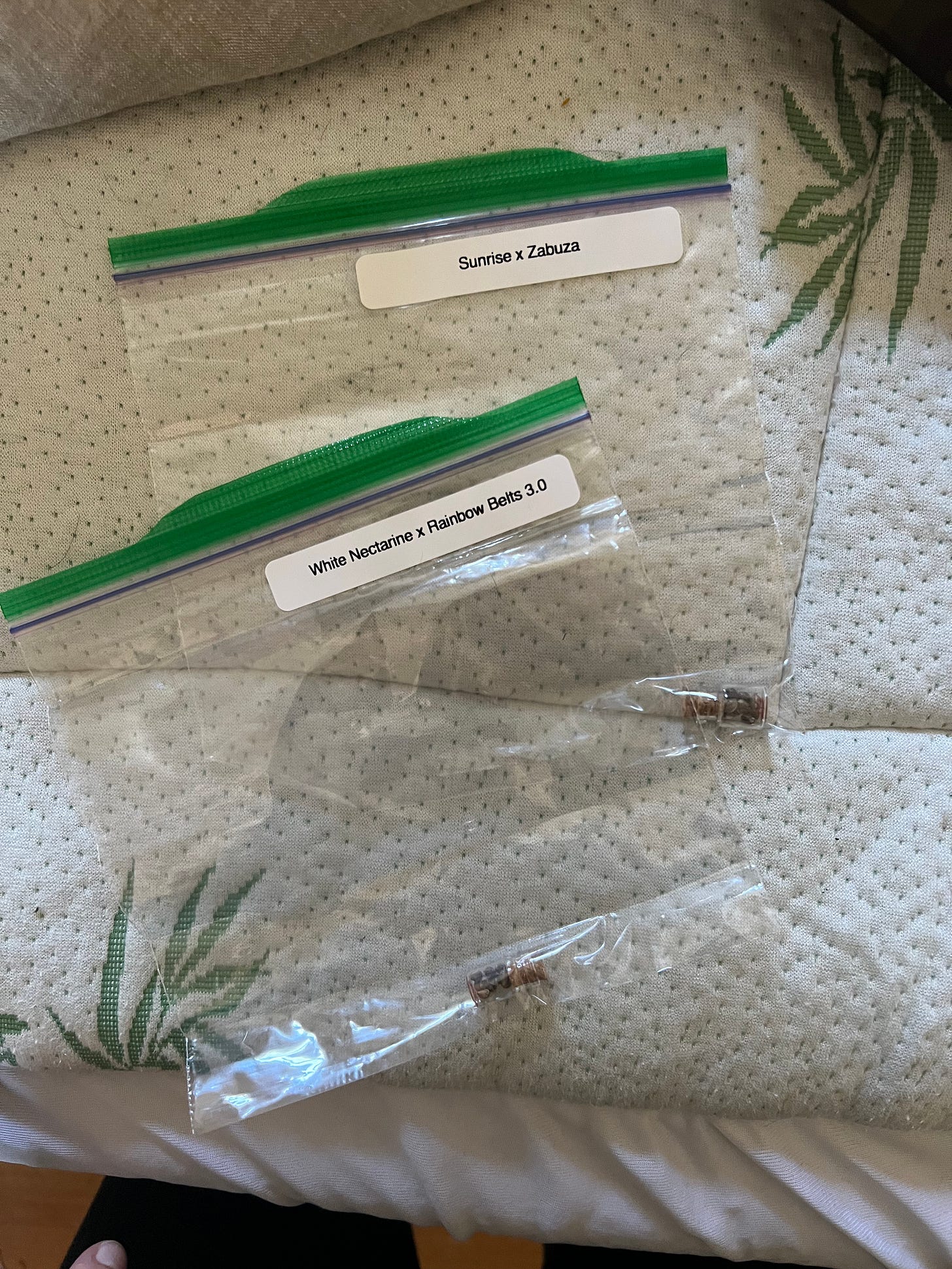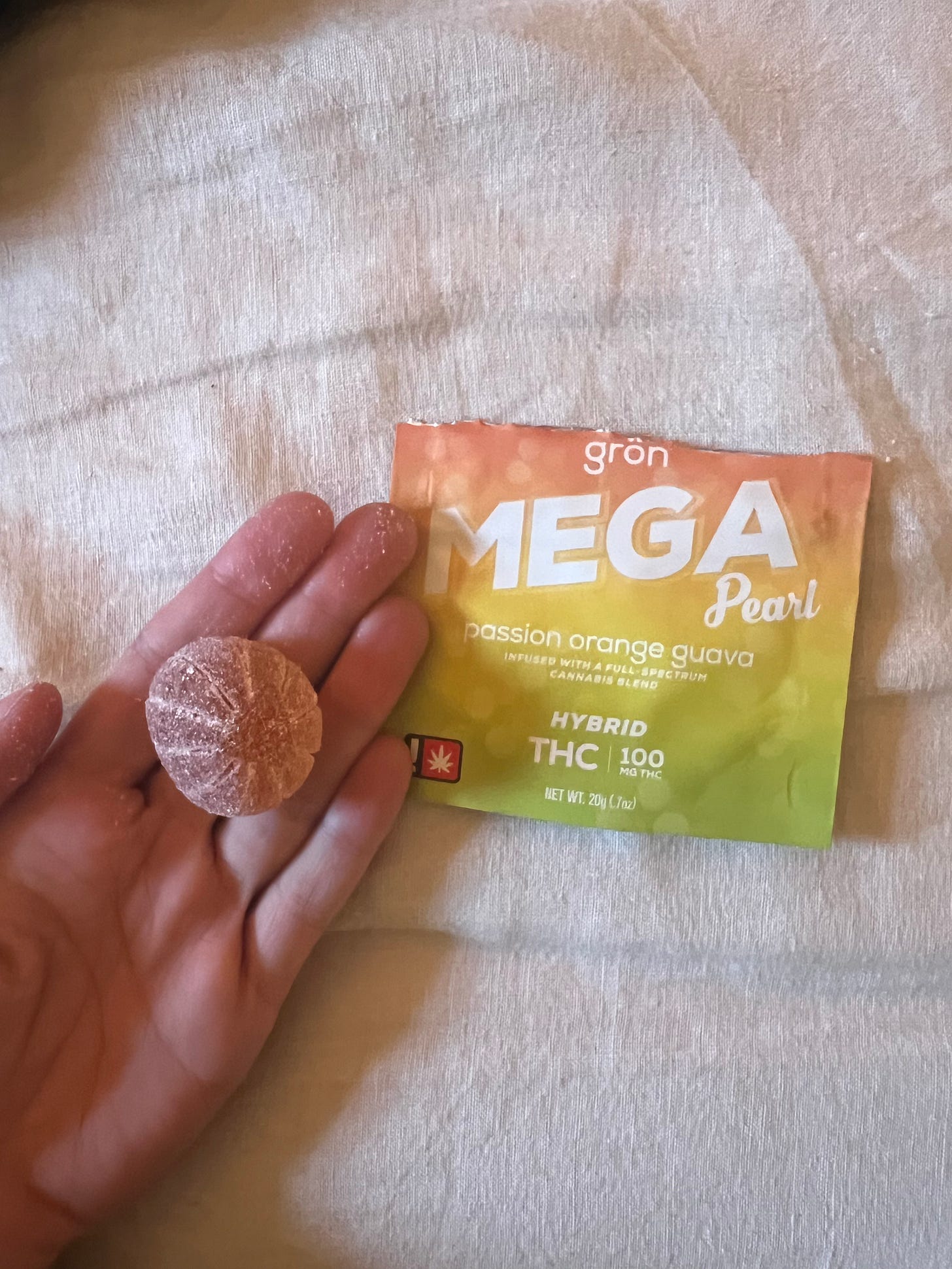Weed, neurodivergence, and the wagging finger of "Cannabis Use Disorder"
Dr. Ben Caplan, MD discusses weed and grey matter and I talk about my favorite edibles and seeds

First of all, this is a little late, but happy growing season to all who celebrate! I just popped these, below, which I received as a very, very special gift from the fine folks at Fig Farms and have permission to breed with, as well. I feel honored and lucky. I also just got different seeds to my dad in New York, who is growing outdoors this summer. He informed me this morning that he used to grow in the backyard when I was a kid. Had no idea. Anyway, I feel like the White Nectarine x Rainbow Belts will change my life. I’m also really excited about Sunrise x Zabuza (the latter is a key fighter in Fig’s gorgeous Momochi cultivar). Stay tuned.
The good doctor,
, is back, and I’ve asked him to speak about a topic that is personal to me: “Cannabis Use Disorder,” neurodivergence, and mental health. Subscribe to Dr. Caplan’s substack here.Read about my past musings on “Cannabis Use Disorder” here. And on cannabis and anxiety here.
Mental health with a side order of neurodivergence, all atop a big steaming pile of “Cannabis Use Disorder” -
Cannabis has been used both recreationally and medicinally for thousands of years. While many find it beneficial for alleviating symptoms of various conditions, including chronic pain, sleeplessness, anxiety, and depression, it can also have unwanted effects on mental health. Success is a balance, and it can be a delicate one.
One of my patients described getting cannabis right as like trying to balance a marble on a plate. It’s easy to overcorrect, push hard one way or another, and force the marble off balance. I like this analogy, but I think the way cannabis works is fundamentally different from traditional medicines. Traditional medicines often try to counterbalance symptoms by pushing against them, attempting to suppress or negate what’s deemed too much or too little. It can feel like a constant battle to correct imbalances by counteracting specific issues.
In contrast, cannabis medicine seeks to bring the body into a state of balance. Instead of fighting symptoms, it works to harmonize and support the body’s natural ability to regulate itself. This is especially important for children, as it enhances their overall well-being rather than just addressing individual symptoms. For instance, rather than simply suppressing seizures or anxiety, cannabis aims to reduce their frequency and severity by promoting a state of equilibrium, allowing the body to function more smoothly and naturally.
This approach offers a gentler, more holistic alternative to traditional medications. It fosters a sense of harmony and well-being that supports the child’s overall health and development. The shift from counterbalancing to balancing is subtle but profoundly impactful, providing a more integrated and effective path to wellness.
Positive Impacts of Cannabis
1. Anxiety and Depression: Many people find relief from anxiety and depression through cannabis. Cannabinoids like CBD are known for their calming effects, which can help improve mood without the high from THC. At CED Clinic, we’ve observed 72% of our patients eliminate at least one traditional medication from their routine after developing a steady routine with cannabis.
2. Stress Relief: Cannabis promotes relaxation and eases stress. The euphoria from THC can offer a temporary break from the pressures of daily life, and a fine-tuned regimen of CBD could help lift even the grumpiest of the seven dwarfs to a place of relaxation.
3. Sleep Disorders: For those with trouble sleeping, especially insomnia, cannabis products with a mindful selection of terpenes can help improve sleep quality and duration without the baggage of a stone-over. Sleepy (the dwarf) need not apply.
Negative Impacts
1. Psychosis and Schizophrenia: High doses of THC can sometimes trigger psychotic episodes, particularly among those individuals with a family history of these disorders or who are uniquely predisposed to conditions like schizophrenia. Regular use, but even infrequent use, can worsen these symptoms and lead to more frequent episodes, again - for the individuals already predisposed. Fun fact: there is also evidence that cannabis can help pull people OUT of episodes of psychosis and schizophrenia. Much is still to be learned about the overlap between these complex disorders and this multifaceted plant. We do know that we don’t yet have anything close to a full picture.
2. Anxiety and Paranoia: While cannabis can often and effectively reduce anxiety for many, consuming the wrong products or taking it in the wrong doses can also cause anxiety and paranoia, particularly at high doses or with THC-rich strains. Paranoia is defined as “fear without attribution.” When high doses of THC stimulate the heart to beat rapidly, the brain can interpret this as evidence that the body is afraid of something. This is similar to how your heart races and adrenaline flows when your midbrain (specifically a part of the midbrain called the superior colliculus) rapidly and unconsciously processes visual stimuli, such as detecting a snake. This allows for quick reflexive actions, like jumping back, even before the conscious brain (in the cortex) fully recognizes the threat. This rapid response is part of an evolutionary survival mechanism. So, if your brain interprets a fast beating heart as a sign you should be afraid, and your brain doesn’t know what you are afraid of… you get fear without attribution,or paranoia.
3. Cognitive Impairment: Long-term cannabis use, particularly when it begins at a young age, can affect memory, attention, and decision-making. Short-sighted studies have often cited this as evidence that cannabis makes people less intelligent. However, more recent studies that required participants to sober up before retaking cognitive tests found that the initial results showing decreased cognition largely disappeared. This suggests that the cognitive impairments were temporary and related to being under the influence. Nevertheless, there is some truth to the idea that cannabis can lead to a neglect of important life skills. For example, if cannabis use makes you feel content, you might be less likely to seek emotional support from friends when you're sad or feel less motivated to prepare thoroughly for a job interview. Over time, not practicing these essential skills can certainly lead to downstream problems.
Like with all things, awareness is key.
Behavioral Disorders and Neurodivergence
Did you know that children born with Autism Spectrum Disorder (ASD) tend to have lower circulating levels of natural endocannabinoids? Cannabis interacts with the endocannabinoid system, which regulates mood, memory, appetite, pain, and more. If someone is born with lower endocannabinoid "tone," it stands to reason that they might find external supplementation of cannabinoids beneficial. This interaction can affect individuals with behavioral disorders and neurodivergent conditions differently.
Attention Deficit Hyperactivity Disorder (ADHD)
Some individuals with ADHD use cannabis to help with focus and reduce hyperactivity. However, the evidence is mixed; cannabis can sometimes worsen symptoms or lead to dependency. This may result in a sense of contentment with symptoms that do not necessarily align with the patient's initial goals for improvement.
Autism Spectrum Disorder (ASD)
Cannabis, particularly higher doses of THC and moderate doses of CBD, shows promise in alleviating symptoms of ASD, such as anxiety, aggression, self-harming behavior, and even language processing in younger patients with ASD More research is needed to understand the long-term effects and optimal dosages, but boy does it look great from this point of infancy in the field.
Cannabis Use Disorder (CUD)
Cannabis Use Disorder is a heaping trash pile of a diagnosis. The official definition is as follows: A pattern of problematic cannabis use that leads to significant impairment or distress. According to the DSM-5, CUD is diagnosed if at least two of the following symptoms occur within a 12-month period:
1. Using cannabis in larger amounts or over a longer period than intended.
2. Persistent desire or unsuccessful efforts to cut down or control cannabis use.
3. Spending a lot of time obtaining, using, or recovering from cannabis.
4. Craving or a strong desire to use cannabis.
5. Recurrent cannabis use resulting in failure to fulfill major role obligations.
6. Continued use despite social or interpersonal problems caused by cannabis use.
7. Giving up or reducing important activities due to cannabis use.
8. Using cannabis in physically hazardous situations.
9. Continued use despite knowing it causes physical or psychological problems.
10. Tolerance, needing more cannabis to achieve the desired effect.
11. Withdrawal symptoms when not using cannabis.
Take a careful look at the image below to gather my thoughts on this ridiculous diagnosis. It reminds me of the foolishness of bloodletting from the medieval times.
How This Ties into Mental Health and Behavioral Disorders
Because Cannabis Use Disorder (CUD) is deeply ingrained in the mainstream medical lexicon and training, changing this perspective may take years. Historically, medicine worldwide has been influenced by the belief that cannabis worsens mental health issues and behavioral disorders. For instance, using cannabis to cope with anxiety or depression may lead to dependency, ultimately worsening mental health over time. Similarly, individuals with ADHD or ASD might use cannabis for symptom relief but find that long-term use leads to tolerance and withdrawal, complicating their condition.
Unfortunately, too few doctors follow the evolving literature closely or learn from their patients, who are often the true experts in clinical outcomes. The lack of clinical experience and ongoing education means that many doctors remain entrenched in outdated beliefs about cannabis. As a result, they may be slow to recognize that what was taught in medical school is incomplete and needs updating through real-world patient experiences.
The stigma surrounding cannabis use is what most strongly contributes to social isolation and stress, impacting mental health. Legal issues related to cannabis use also cause significant distress, especially in areas where cannabis remains illegal. However, guided cannabis use, with knowledgeable experts, is a pathway to reduced medications, reduced burden of disease, and improved wellness.
Final Thoughts
Cannabis has a complex relationship with mental health, behavioral disorders, and neurodivergence. While it benefits many, it also carries some risks, particularly concerning dependency and what the world sees as CUD. Understanding these dynamics is crucial for healthcare providers and individuals considering cannabis for therapeutic use. As research evolves, so will our understanding of how to maximize the benefits of cannabis while minimizing risks. For those struggling with CUD, professional guidance and support are essential to navigate challenges and optimize mental health outcomes.
For those who feel like the battle is already lost - I’m one doctor ready to fight for what I think is right.
I host a free webpage called “Ask Dr. Caplan,” where I answered a question about this designation for those interested in reading more.
Things I’m enjoying lately…
My new favorite edibles are, sadly, not available in the California market. Grön is headquartered in Portland, OR and available in Arizona, Missouri, Nevada, New Jersey, New York, Oregon, and across Canada, with multiple new markets scheduled to be added by the end of 2024. Here’s a nice guide to edibles on its website.
The funniest and best product they make is the MEGA Pearl, which is basically a mandarin orange-sized, 100mg-dosed, sugar-coated, single-serving gummy. They have graciously notched the pearl in 10mg increments, further cementing its orange-like appearance. The notches are pretttttttty shallow, though, so it’s clear what you’re supposed to do with this bad boy: instead of pulling out slices, like an orange, I am pretty certain the best delivery method is chomping it like an apple. That’s what I do, anyway, and it’s been going wonderfully for me.
The brand uses real fruit juices (my favorite is the papaya, orange, and guava flavor—POG, if you’re experienced. I also like cherry limeade) and the MEGA Pearls are gluten and soy-free. They’re made with full-spectrum extracts. They’re also priced attractively, averaging around $8 for 100mg, which is great bang for your THC buck (considering other prices in the legal market), especially if you’re a patient.
Grön’s other products, which use fair trade chocolate, come in lower doses, but they’re designed for serious consumers. The Pips, for example, are little chocolate balls, like M&Ms, with various minor cannabinoids and 5mg THC a pop. It’s the perfect solution for someone who wants a solid handful of something delicious and can also handle the dosage without needing to overload on sugar, like with other edibles designed for lower-dose customers. The Pips are also a nice incremental dosage add-on for those who eat chunks of MEGA Pearls at a time.
Clearly, I’m a fan. They’re thoughtful, well-made products that keep the heads in mind and at the forefront of product design.













Excellent post! Enjoyed reading Dr. Caplan's guest post and 💯 agree with you on Grön. Best edibles for sure.
Loved this piece so much. Thanks for your insight!